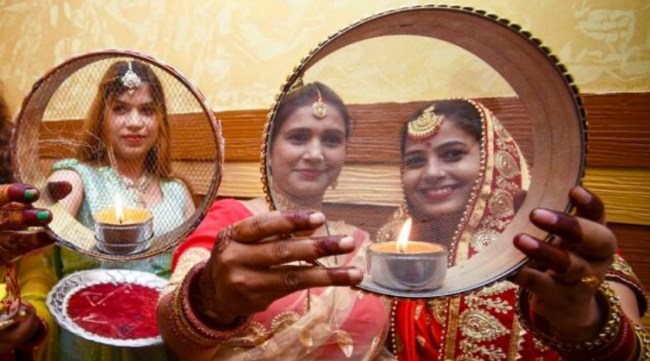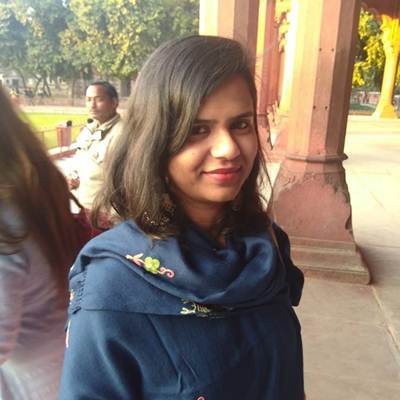Opinion I am a feminist and my Karwa Chauth does not weaken my fight against patriarchy
The assumption that every woman who is observing Karwa Chauth is brainwashed and conditioned is condescending. It is the same assumption patriarchy makes – that a woman is incapable of making her own decisions, and is acting on cues whispered by external forces.
 Yashee writes: Karwa Chauth is a choice. Not doing Karwa Chauth is a choice. Hijab is a choice. Bikini is a choice. Burkha is a choice. Makeup is a choice. No makeup is a choice. And we are all capable of making our own decisions, thank you kindly. (PTI)
Yashee writes: Karwa Chauth is a choice. Not doing Karwa Chauth is a choice. Hijab is a choice. Bikini is a choice. Burkha is a choice. Makeup is a choice. No makeup is a choice. And we are all capable of making our own decisions, thank you kindly. (PTI) I got married this year and on October 13, celebrated Karwa Chauth with great fun and finery. The month before, I also celebrated Teej, which is the less-flashy Bihari cousin of Karwa Chauth. I call myself a feminist, and am privileged enough to live in a tiny urban liberal bubble. For many of my friends, thus, my don’t-eat-but-pray-and-love stance has become a kadwa pill to swallow. Was my feminism just a mask for my true vermillion red colours? Some think my husband is to blame. Like most upper-caste liberal men, is he finally choosing the comfort of conforming and dragging me down too?
Most of these people are not malicious or mocking, just genuinely aghast.
So, will their questions make me give up the rituals? No.
Do their questions offend my religious feelings? God, no.
Can equivalences be drawn between examining the rituals of the majority community and mocking the faith of minorities? A louder and more emphatic no.
Karwa Chauth (or Teej) as a practice is patriarchal and regressive, and I completely support every woman who does not want to follow it. Of course, there is no logic in the idea that my fasting will keep him healthy. So why do I do it? Because I am religious, I love my husband, and for the greater cause of him living long and prospering, I would like God on my side. Faith is not exactly governed by logic, one of its central principles is the willing suspension of disbelief. So, on the day, I don a red sari, I gather the pooja paraphernalia, and I pray, hard, to keep us both happy and safe.
Of course, I can pray on any other day. Why choose Karwa Chauth, which has unquestionably patriarchal connotations? Because I find comfort in rituals, and cosiness in a shared experience.
I grew up watching my mother (who is yet to meet a man or god who could dictate to her) and all our neighbours keep the Teej fast, fathers doing the household chores, and the day ending with a common pooja and general revelry. For me, the day has associations with being happy and auspicious, and I want to carry that on into my own marriage. This year, my cousins, friends, and sister-in-law were united on WhatsApp, exchanging wisdom, best practices, and of course best pictures, and it was nice to be together in it.
Many of us are feminists, and did we wonder if in all this, we were furthering patriarchy? Yes, we did.
But here’s the thing – all religious books were written by men, and no religious book is exactly the feminist manifesto. Marriage is the Big Daddy of all patriarchal institutions. There are people who have entirely rejected religion and marriage in the fight against patriarchy, and you go, dear respected sisters and brothers. I most heartily cheer you on, while myself taking case-by-case calls.
To return to my maligned but hopefully life-lengthened husband, he is an atheist, and does not understand my need for God. But like any sensible human, he respects it. He is deeply uncomfortable with practices rooted in upper-caste patriarchy. He also hates anything that puts him at the centre, any kind of spotlight, or chhanni-filtered moonlight.
But he saw I was serious about the Teej-Karwa Chauth scheme, and helped me through it, also fasting with me (and constantly explaining that it did nothing because the cultural burden is still only on me). I found this the decent and supportive thing to do, while if he had lectured me on failing the feminist cause, I would have found it patronising, and been livid.
The assumption that every woman who is observing Karwa Chauth is brainwashed and conditioned is condescending. It is the same assumption patriarchy makes – that a woman is incapable of making her own decisions, and is acting on cues whispered by external forces.
Karwa Chauth is a choice. Not doing Karwa Chauth is a choice. Hijab is a choice. Bikini is a choice. Burkha is a choice. Makeup is a choice. No makeup is a choice. And we are all capable of making our own decisions, thank you kindly.
The next – and very good — argument is that even if Karwa Chauth is my choice, it is a poor choice. That I am exerting my free will in a direction detrimental to the cause of women’s liberation. Indeed, my husband asked me what example I wanted to set for our five-year-old niece. My answer was that she has not just one day, but my whole life to see as an example, all my decisions and my conduct, including the fact that I stand up for what I believe in.
Does choosing to carry on with a regressive tradition – even if you insert liberal twists into it — make the battle harder for women who don’t want to? Yes, I think it does. But is abandoning traditions the answer? Or can we, through a more relaxed observance that day, and through our actions on the other 364 days, remove or at least dull their patriarchal sting?
Finally, what will most definitely not help the feminist cause is creating more divisions among women. One instance of this was how, in the Karnataka hijab case, a simple question of choice was obfuscated by the “can the hijab be progressive” debate, often by well-meaning women. The certificates of good feminist-bad feminist, too traditional-too modern, too religious-too rebellious, help no one. You wear your hijab, I will do my Karwa Chauth. You reject religion. You reject marriage. We will still all be women, and we will still all be together in this.


